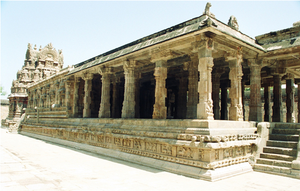Tuesday, March 22, 2011
Module no. 6: Tamil Literature
Posted by: Beverly Abelon
________________________________________________________________

Tamil literature has a rich and long literary tradition spanning more than 2000 years. Tolkaappiyam has been credited as the oldest work in Tamil available today. The history of Tamil literature follows the history of Tamil Nadu, closely following the social and political trends of various periods. The secular nature of the early Sangam poetry gave way to works of religious and didactic nature during the Middle Ages. Tirukkural is a fine example of such work on human behaviour and political morals. A wave of religious revival helped generate a great volume of literary output by Saivite and Vaishnavite authors. Jain and Buddhist authors during the medieval period and Muslim and European authors later also contributed to the growth of Tamil literature.
A revival of Tamil literature took place from the late 19th century when works of religious and philosophical nature were written in a style that made it easier for the common people to enjoy. Nationalist poets began to utilise the power of poetry in influencing the masses. Short stories and novels began to appear. The popularity of Tamil Cinema has also provided opportunities for modern Tamil poets to emerge.
The region of Tamil Nadu in modern India has been under continuous human habitation since prehistoric times, and the history of Tamil Nadu and the civilization of the Tamil people are among the oldest in the world. Throughout its history, spanning the early Paleolithic age to modern times, this region has coexisted with various external cultures. Except for relatively short periods in its history, the Tamil region has remained independent of external occupation.
The four ancient Tamil empires of Chera, Chola, Pandya and Pallava were of ancient origins. Together they ruled over this land with a unique culture and language, contributing to the growth of some of the oldest extant literature in the world. They had extensive maritime trade contacts with the Roman empire. These three dynasties were in constant struggle with each other vying for hegemony over the land. Invasion by the Kalabhras during the 3rd century disturbed the traditional order of the land by displacing the three ruling kingdoms. These occupiers were overthrown by the resurgence of the Pandyas and the Pallavas, who restored the traditional kingdoms. The Cholas, who re-emerged from obscurity in the 9th century by defeating the Pallavas and the Pandyas, rose to become a great power and extended their empire over the entire southern peninsula. At its height the Chola empire spanned almost 3,600,000 km² (1,389,968 sq mi) straddling the Bay of Bengal. The Chola navy held sway over the Sri Vijaya kingdom in Southeast Asia.
Thiru Kural of Tamil Nadu

Thiru Valluvar's, Thiru Kural has today come to be documented as a classic in the
literature of the entire world. This poem consisting of 133 sections of 10 couplets each which was predictable as a masterpiece of ancient literature in Tamil in its own times, has stood the test of history and is established by posterity as a decisive work which has predisposed the thoughts of man throughout the centuries. It is not only of great artistic and stylistic literary value, but also a direct to the art of living with pieces of precious wisdom. Thirukkural's immortality and universality are indisputable. Its ethics and values are appropriate to all religions, nations and time. It has been interpreted in over 60 languages of the world.
Biography
Thiru Valluvar, the author of Thiru Kural, was not only a sage with the good of humankind at heart, a psychologist having deep imminent into the intricacies of human nature and a philosopher with an urge to restructuring. He is believed to have born 30 years earlier than Jesus Christ. Thiruvalluvar himself was one of those few eminent men who had their roots strongly in the history and culture of the Tamils of the Sangam Age, who had made his own religious and social knowledge that blew into Tamil Nadu, from outside the state and country in those days and in addition, had his own distinctive vision of the future. In Tamil Nadu, Tamil calendar is dated from that stage and referred as Thiruvalluvar Aandu (Year). It is however, a disappointment that we know so little about the Mastermind who authored the great work. What we know about him is that he existed in Mylapore which now forms a division of the city of Chennai and that he was a wedded man and a weaver by occupation.
Inner thought of his spirit and the depth of his integrated thinking surfaced the Kural, the ethical line of which is not clouded by code of belief or discrimination of any kind. We can find certain likeness between Valluvar's thought and those of Buddha, Mahaveera, Plato and Confucius, these are only reasonable absorptions by a successive thinker of ideas, of which he endorses from among those that have lead him or natural similarities in the working of great minds. But there are also basic differentiation and sizeable originality of thought and expression for ahead of his-own times, specifically in respect of his handling of Godliness, casteless society, importance of agriculture, taxation with peoples' consent and facilitate physical love. That is why Thiruvalluvar's Thirukural has continued to magnetize the world's best minds down the ages.
The utter plainness of his language, his crystal clear expressions, accurate and forceful, his brevity, his choice articulation, no less his inwardness, his learning, culture and wisdom, his catholicity and eclecticism, his gentle wittiness and wholesome counsel have made him an object of reverence for all time and his book is considered the Sacred of the Tamils.
Assessment
1. What is considered the "Sacred of the Tamils."
2. Whose the author of Thiru Kural?
3. What is the great contribution of the poem to the culture of Tamil?


0 comments:
Post a Comment